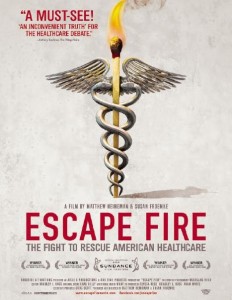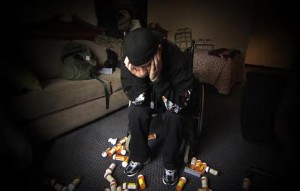By Erika Schultz, Graduate Intern at AOMA Graduate School of Integrative Medicine
- Americans spend $8,000 per capita on healthcare in comparison to $3,000 per capita in other developed countries and has some of the worst health outcomes.
- Insurance rates have increased at such a rate since 1945 that if the same inflation were applied a dozen eggs cost would now cost $55 and a gallon milk $48
- The United States is listed as #50 on the list of countries with greatest life expectancy.
These are just a few of the powerful facts and anecdotes sprinkled throughout the film “Escape Fire: The Fight to Rescue American Healthcare” – a documentary full of interviews with those who are leading the way to a more integrative approach to medical care. The film features Dr. Andrew Weil, Dr. Don Berwick, and Dr. Dean Ornish to name a few. In addition, we hear from primary care physicians on the front-lines of treating patients who are completely overwhelmed by a system designed to reward them for procedures instead of outcomes.
Acupuncture Helps Veterans Managing PTSD

Erika Schultz
The filmmakers spend a significant amount of time featuring the use of acupuncture by the Army in managing chronic pain and post traumatic stress disorder (PTSD). Sergeant Robert Yates – a young, wheelchair bound soldier rehabilitating from severe physical and emotional injuries is one patient making significant strides from a treatment plan that includes acupuncture and mind-body therapies at Walter Reed Army Medical Center.
At first, Yates is severely dependent upon over 30 pharmaceutical drugs to manage his condition, but over time we watch as he benefits from an integrative medical program designed to get him off of the drugs and better equip him to handle his health condition.
 The film’s unique title is addressed only briefly at the beginning, but when explored further contains an important message. The term “escape fire” is in reference to a technique used by smoke jumper, Wag Dodge, in attempts to escape an out of control fire in the hills of Montana in 1949. Dodge lit a small grass fire to create a space for him and his crew to avert the flames of the main fire. In the chaos, his crew misunderstood his intentions and continued onto the top of the ridge in an attempt to escape the burning flames – ultimately meeting their fate.
The film’s unique title is addressed only briefly at the beginning, but when explored further contains an important message. The term “escape fire” is in reference to a technique used by smoke jumper, Wag Dodge, in attempts to escape an out of control fire in the hills of Montana in 1949. Dodge lit a small grass fire to create a space for him and his crew to avert the flames of the main fire. In the chaos, his crew misunderstood his intentions and continued onto the top of the ridge in an attempt to escape the burning flames – ultimately meeting their fate.
The filmmakers used this story as the basic premise of the film – indicating that some of the obvious solutions in healthcare reform are right in front of us – in a most common sense way but that we are so overwhelmed by the chaos of it all that we are unable to see them.
Implementing Acupuncture Into Our Healthcare System
For example, the film gives recognition to the fact that in 1998 healthcare leaders agreed that studies conducted to date provided enough efficacy toward acupuncture as a treatment modality but that 15 years later we are still struggling to implement it into our healthcare system.

Sergeant Robert Yates
They go on further to propose that we are caught up in the rhetoric centered around how were going to pay for healthcare reform and making sure that everyone is going to get access to it that we are missing the forest from the trees and the forest is on fire. The system is broken and the focus needs to be on fixing it.
Dr. Andrew Weil says that as a society of healthcare consumers we pay lip service to prevention. Healthcare leaders propose a more personal, more humanized approach to medicine with a focus on low-cost methods of prevention and lifestyle changes that will bring costs down and ensure better outcomes for patients. The film ends appropriately with a concise and powerful statement that “we can change the healthcare system, but not until we change the conversation.”
How can you become a part of the conversation?
Significant strides in advocacy are taking place over the next 24 months in the acupuncture and Oriental medicine (AOM) community that are mission critical. Lobbying efforts on Capitol Hill will focus on positioning acupuncture for recognition in the American healthcare system and inclusion as a health benefit for Medicare recipients, federal employees, and military personnel and their dependents.
How can you become a part of the conversation? And better yet, the solution? Become a member of your AOM state and national organizations and check out the film’s First Aid Kit. It contains a variety of resources for patients, doctors, and educators to use as a part of the action team that changes health care in America.
